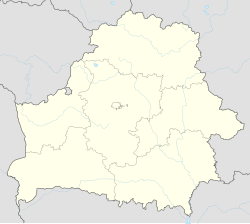Chashniki
Chashniki | |
|---|---|
 The Church of the Holy Savior, 2015 | |
| Coordinates: 54°51′12″N 29°09′53″E / 54.85333°N 29.16472°E | |
| Country | Belarus |
| Region | Vitebsk Region |
| District | Chashniki District |
| Population (2024)[1] | |
• Total | 7,736 |
| Time zone | UTC+3 (MSK) |
| Postal code | 211149 |
| Area code | +375 2133 |
| Vehicle registration | 2 |
Chashniki (Belarusian: Чашнікі, romanized: Čašniki;[a] Russian: Чашники; Polish: Czaśniki; Lithuanian: Čašnikai) is a town in Vitebsk Region, Belarus.[1] It serves as the administrative center of Chashniki District.[1] It is famous for the Battle of Ula during the Livonian War and the Battle of Chashniki that took place during the French invasion of Russia in 1812. In 2021, its population was 8,092.[2] As of 2024, it has a population of 7,736.[1]
Etymology
It is believed that the term Chashniki comes from the Belarusian word, Chashnik (Чашнік) which referred to an official who would pour drinks for the Lithuanian prince. Another possible etymology comes from the Chashnitsy lowlands, which connects the name of the settlements to [in the] bowl.[3]
History
Chashniki is a historical settlement, formerly part of the Polish-Lithuanian Polotsk Voivodeship.
The town was formerly home to the Chashniki castle, which was erected during the Livonian War under order of Ivan the Terrible. It burned down during the Great Northern War during the advancement of Peter the Great's troops through the area.[4]
Chashniki has historically had 2 churches. The first was the Church of St. Luke and Dominican Monastery, a baroque cathedral erected in the 17th century and was demolished by Soviet authorities in 1964. The second was the Church of the Holy Savior (Chashniki), an example of classicism established in 1843. It was restored in 2000.
Geography
Chashniki is located on the Vula River, a tributary of the Daugava.
People
Gallery
- The Church of St. Luke and the Dominican Monastery, 1913
Notes
References
- ^ a b c d "Численность населения на 1 января 2024 г. и среднегодовая численность населения за 2023 год по Республике Беларусь в разрезе областей, районов, городов, поселков городского типа". belsat.gov.by. Archived from the original on 2 April 2024. Retrieved 13 April 2024.
- ^ "НАЦИОНАЛЬНЫЙ СТАТИСТИЧЕСКИЙ КОМИТЕТ РЕСПУБЛИКИ БЕЛАРУСЬ" (PDF). 2021-08-30. Archived from the original (PDF) on 30 Aug 2021. Retrieved 2023-04-06.
- ^ Жучкевіч, Вадзім (1974). Краткий топонимический словарь Белоруссии (in Belarusian). Minsk. p. 398.
{{cite book}}: CS1 maint: location missing publisher (link) - ^ Tkachoŭ, M.A. (1991). Zamki i li͡u︡dzi (in Belarusian). Minsk: Navuka i tėkhnika. p. 184. ISBN 9785343008807.
External links
- Photos on Radzima.org
- Jewish Cemeteries in Chashniki Archived 2016-08-15 at the Wayback Machine
- The murder of the Jews of Chashniki during World War II, at Yad Vashem website.





